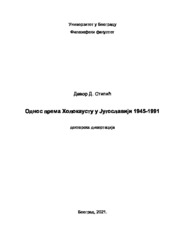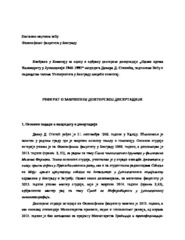Приказ основних података о дисертацији
Однос према Холокаусту у Југославији: 1945-1991
Holocaust remembrance in Yugoslavia: 1945-1991
| dc.contributor.advisor | Vučetić, Radina | |
| dc.contributor.other | Ristović, Milan | |
| dc.contributor.other | Manojlović-Pintar, Olga | |
| dc.contributor.other | Koljanin, Milan | |
| dc.creator | Stipić, Davor | |
| dc.date.accessioned | 2022-09-06T14:11:20Z | |
| dc.date.available | 2022-09-06T14:11:20Z | |
| dc.date.issued | 2022-05-09 | |
| dc.identifier.uri | https://eteze.bg.ac.rs/application/showtheses?thesesId=8732 | |
| dc.identifier.uri | https://fedorabg.bg.ac.rs/fedora/get/o:26312/bdef:Content/download | |
| dc.identifier.uri | https://plus.cobiss.net/cobiss/sr/sr/bib/65561865 | |
| dc.identifier.uri | https://nardus.mpn.gov.rs/handle/123456789/20656 | |
| dc.description.abstract | У докторској дисертацији се анализира колективно и индивидуално сећање на Холокауст у Југославији у периоду од 1945. до 1991. године. Фокус истраживања усмерен је на различите појавне облике памћења: индивидуално, друштвено, политичко и културно, односно различите аспекте колективне свести о прошлости, као што су споменици, јавне комеморације, уметност (филм, књижевност, вајарство), мемоаристика, школство и образовање и музеји. Главни циљ рада је да прикаже и објасни начин на који је креирано колективно сећање на геноцид над Јеврејима, да означи главне носиоце, чуваре и креаторе сећања, проучи њихову политичку идеологију и друштвену праксу, а нарочито, да истакне улогу државе у читавом овом процесу. На тај начин, дисертација представља допринос проучавању политике прошлости и идеолошке инструментализације историје у југословенском социјализму, као и допринос разумевању међународног положаја Југославије, њених веза са Израелом и Светским јеврејским конгресом и односа комунистичке власти према јеврејској заједници и према трагичном наслеђу злочина из периода Другог светског рата. На обликовање друштвеног и политичког односа према Холокаусту и историјске слике Другог светског рата, највише су утицали држава и Комунистичка партија, посредством различитих организација као што су Савез бораца и Социјалистички савез радног народа Југославије или посредством институција система, због чега је генерализована и делимично замагљена слика Холокауста постала део колективног националног историјског искуства. Са друге стране, иако су у креирању колективног памћења држава и партија имале највише утицаја, афирмацији Холокауста као аутентичног феномена савременог доба, највећи допринос, у југословенском случају, дала је јеврејска заједница, која је у контексту квалитативне процене њеног ангажовања по овом питању, представљала најзначајније промотера и носиоца сећања на јеврејске жртве. | sr |
| dc.description.abstract | This dissertation analyzes the phenomenon of Holocaust remembrance in socialist Yugoslavia in a period from 1945 to 1991. The thesis focuses on different formats of memory: individual, social, political and cultural memory, and also on different aspects of collective historical consciousness, such as monuments, public commemorations, museums, system of education and art including film, literature and sculpture. The main goal of the dissertation is to analyze and explain the ways and mechanisms of creating collective Holocaust memory, to mark the most prominent agents, keepers and creators of remembrance, to study their political ideology and memorial practice and, above all, to underline the role of the State and the Communist Party of Yugoslavia in this process. Regarding that, this thesis is a contribution to the researching politics of past and ideological use and abuse of history in Yugoslav socialism, as well as the contribution to the understanding of Yugoslav authentic position in terms of international relations, Yugoslavian connections with Israel and World Jewish Congress and political attitudes of Yugoslav communist authorities toward Jewish community and the difficult and tragic heritage of war crimes committed during the Word War II. The State and the Communist party had the greatest influence on creating collective memory on Holocaust and historical image of World War II. Through the activities of Federation of Yugoslav War veterans (SUBNOR) Socialist Alliance of Working People of Yugoslavia (SSRNJ) and official institutions, the State and the Party shaped generalized and blurred image of civil victimhood that became the part of national historical experience. On the other side, the greatest qualitative contribution to affirmation of Holocaust as unique and original phenomenon of the 20th century was given by Jewish community in Yugoslavia, that was, at the same time, the most important, as Jay Winter call it, agent of memory, although its̕ social influence was much less intensive than the influence of the State and the Party. | en |
| dc.format | application/pdf | |
| dc.language | sr | |
| dc.publisher | Универзитет у Београду, Филозофски факултет | sr |
| dc.rights | openAccess | en |
| dc.rights.uri | https://creativecommons.org/licenses/by-nc-nd/4.0/ | |
| dc.source | Универзитет у Београду | sr |
| dc.subject | Холокауст | sr |
| dc.subject | Holocaust | en |
| dc.subject | Јевреји | sr |
| dc.subject | Југославија | sr |
| dc.subject | комунизам | sr |
| dc.subject | култура сећања | sr |
| dc.subject | Јасеновац | sr |
| dc.subject | логори | sr |
| dc.subject | Други светски рат | sr |
| dc.subject | Jews | en |
| dc.subject | Yugoslavia | en |
| dc.subject | communism | en |
| dc.subject | culture of remembrance | en |
| dc.subject | Jasenovac | en |
| dc.subject | concentration camps | en |
| dc.subject | World War II | en |
| dc.title | Однос према Холокаусту у Југославији: 1945-1991 | sr |
| dc.title.alternative | Holocaust remembrance in Yugoslavia: 1945-1991 | en |
| dc.type | doctoralThesis | |
| dc.rights.license | BY-NC-ND | |
| dc.identifier.fulltext | http://nardus.mpn.gov.rs/bitstream/id/145545/Disertacija_12438.pdf | |
| dc.identifier.fulltext | http://nardus.mpn.gov.rs/bitstream/id/146542/Izvestaj_Stipic.pdf | |
| dc.identifier.rcub | https://hdl.handle.net/21.15107/rcub_nardus_20656 |



